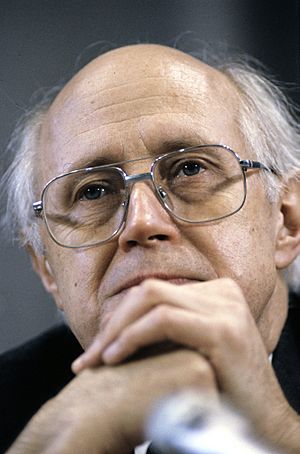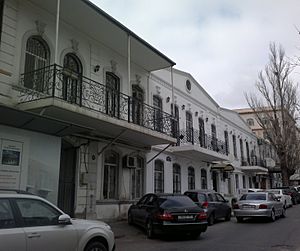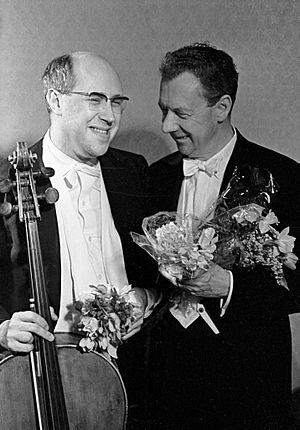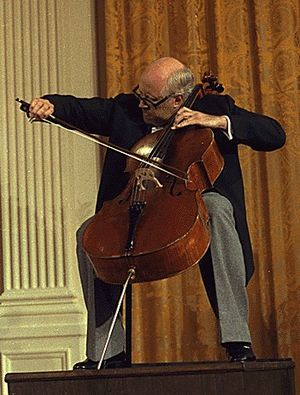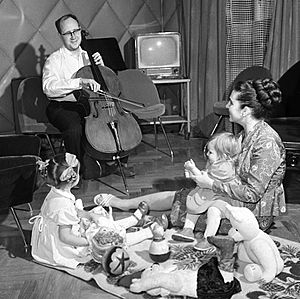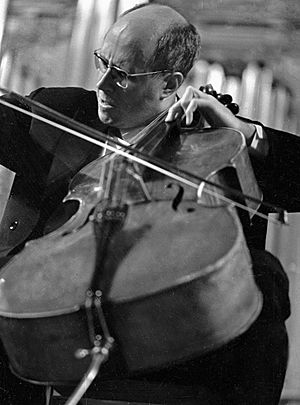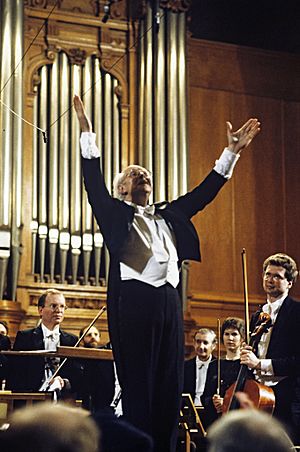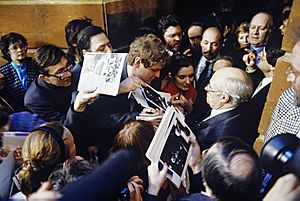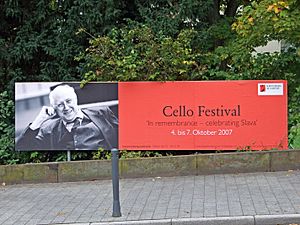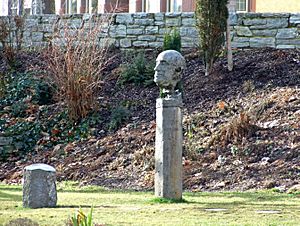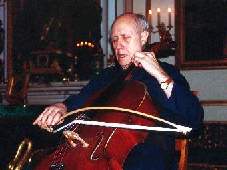Mstislav Rostropovich facts for kids
Mstislav Leopoldovich Rostropovich (27 March 1927 – 27 April 2007) was a very famous Russian cellist and conductor. He was known for his amazing playing and for encouraging new music. He inspired and performed over 100 new pieces for the cello. This made the cello's collection of music much bigger than ever before. He became good friends with many composers, including Dmitri Shostakovich, Sergei Prokofiev, and Benjamin Britten.
Rostropovich was also known around the world for supporting human rights. He won an award for this in 1974. He was married to the opera singer Galina Vishnevskaya. They had two daughters, Olga and Elena Rostropovich.
Contents
Growing Up and Learning Music
Mstislav Rostropovich was born in Baku, Azerbaijan. His parents were both talented musicians. His father, Leopold, was a famous cellist. His mother, Sofiya, was a skilled pianist.
Mstislav started learning piano with his mother when he was just four years old. He began playing the cello at age 10 with his father. In 1943, when he was 16, he joined the Moscow Conservatory. There, he studied cello, piano, conducting, and composing. One of his teachers was the famous composer Dmitri Shostakovich. In 1945, he won a gold medal in a big music competition. He became a cello professor at the Conservatory in 1956.
Early Concerts and Famous Friends
Rostropovich played his first cello concert in 1942. He won top prizes at international music competitions in Prague and Budapest. In 1950, he received the State Stalin Prize, a very high award in the Soviet Union. He was already well-known in his country. He also taught at the Leningrad Conservatory and the Moscow Conservatory.
In 1955, he married Galina Vishnevskaya. She was a leading opera singer at the famous Bolshoi Theatre.
Rostropovich worked closely with many Soviet composers. Sergei Prokofiev wrote his Cello Sonata for Rostropovich in 1949. Prokofiev also dedicated his Symphony-Concerto to him. Dmitri Shostakovich wrote both of his cello concertos for Rostropovich. Rostropovich performed these new pieces for the very first time.
His international career began in 1963. He toured Western Europe and met many composers. One important friend was Benjamin Britten. Britten wrote several pieces especially for Rostropovich, including his Cello Sonata and Cello Symphony. They had a very special connection. Rostropovich's family said he always smiled when talking about "Ben."
Rostropovich also worked with other great composers like Henri Dutilleux, Witold Lutosławski, and Olivier Messiaen.
In 1962, Rostropovich started conducting in public. In 1967, he conducted Tchaikovsky's opera Eugene Onegin at the Bolshoi Theatre. This showed his strong passion for conducting and opera.
Standing Up for Freedom
Rostropovich strongly believed in art without limits and freedom of speech. He supported democratic ideas. This led to problems with the Soviet government. In 1948, his teacher Dmitri Shostakovich was removed from his teaching jobs. Rostropovich, who was 21, quit the conservatory to protest.
In 1970, Rostropovich gave shelter to Aleksandr Solzhenitsyn, a writer who was in trouble with the government. Because of his friendship with Solzhenitsyn and his support for other people who disagreed with the government, Rostropovich faced difficulties. He and his wife were not allowed to tour outside the country. His performances in major Soviet cities were also limited.
In 1974, Rostropovich left the Soviet Union with his family and moved to the United States. In 1978, the Soviet government took away his citizenship. This was because he spoke out against the Soviet Union's limits on cultural freedom. He did not return to the Soviet Union until 1990.
Later Career and Return Home
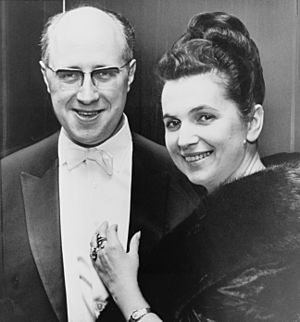
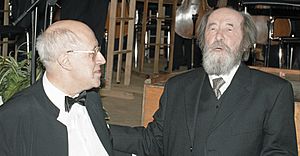
From 1977 to 1994, Rostropovich was the music director and conductor of the U.S. National Symphony Orchestra in Washington, D.C. He also performed with other famous musicians. He founded the Mstislav Rostropovich Baku International Festival.
His unplanned performance during the fall of the Berlin Wall in 1989 was seen around the world. His Soviet citizenship was given back to him in 1990. In August 1991, when there were tanks in the streets of Moscow, Rostropovich bravely flew back to Russia. He joined Boris Yeltsin to support democracy.
Rostropovich received many international awards. These included the French Legion of Honor. He was an activist who fought for freedom in art and politics. As an ambassador for UNESCO, he supported many education and culture projects. He was also a close friend of Queen Sofía of Spain.
With his wife, Galina Vishnevskaya, he started the Rostropovich-Vishnevskaya Foundation in 1991. This group helps improve the health of children in the former Soviet Union. The Rostropovich Home Museum opened in Baku in 2002.
His Last Years
Rostropovich's health became weaker in 2006. He was treated for an illness. Russian President Vladimir Putin visited him to plan a celebration for his 80th birthday. Rostropovich attended the celebration in March 2007, but he was very frail.
He passed away on April 27, 2007, at the age of 80. His body was placed in an open coffin at the Moscow Conservatory. Thousands of people, including President Putin and Queen Sofia of Spain, came to say goodbye. Rostropovich was buried in the Novodevichy Cemetery.
His Amazing Impact
Rostropovich had a huge influence on younger cellists. Many have said he was their inspiration. Some even called him "probably the greatest cellist of all time."
He asked many composers to write new pieces for the cello. This made the cello's collection of music much larger than ever before. He performed 117 new compositions for the first time. He was also famous for his performances of classic cello pieces, like Dvořák's Cello Concerto.
Rostropovich was also known for being very kind. Once, when he heard that a friend's baby daughter had died, he flew to Tokyo. He took a long taxi ride to his friend's house. He then played a beautiful Bach piece outside as a way to show his sympathy. After that, he got back in the taxi and flew back to Europe.
In 2012, a statue of Rostropovich was put up in a central square in Moscow.
Awards and Recognition
Rostropovich received about 50 awards during his life, including:
Awards from Russia and the USSR
- Order of Merit for the Fatherland (1st and 2nd class)
- Medal Defender of a Free Russia
- People's Artist of the USSR
- State Prize of the Russian Federation
- Lenin Prize
- Stalin Prize
Other Important Awards
- Praemium Imperiale (Japan)
- Heydar Aliyev Order (Azerbaijan)
- Grand Cordon of the Order of Leopold (Belgium)
- Grand Cross of the Order of Merit of the Federal Republic of Germany
- Grand Officer of the Legion of Honour (France)
- Presidential Medal of Freedom (USA)
- Kennedy Center Honors (USA)
- Order of the Rising Sun, Gold and Silver Star (Japan)
- Honorary Knight Commander of the Order of the British Empire (UK)
- Polar Music Prize
- Ernst von Siemens Music Prize
- Sonning Award (Denmark)
- Prince of Asturias Award (Spain)
- Wolf Prize in Arts
- Gold UNESCO Mozart Medal
- Roosevelt Institute's Four Freedoms Award for the Freedom of Speech
Honorary Citizenships
Honorary Degrees
- Honorary Doctorate from University of British Columbia
- Honorary Doctor of Humane Letters from Northern Illinois University
- Laurea ad honorem from the University of Bologna
Music Awards
- Grammy Award for Best Chamber Music Performance (1984)
|
See also
 In Spanish: Mstislav Rostropóvich para niños
In Spanish: Mstislav Rostropóvich para niños
 | William Lucy |
 | Charles Hayes |
 | Cleveland Robinson |


